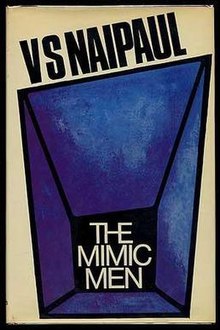The Mimic Men

First edition
|
|
| Author | V. S. Naipaul |
|---|---|
| Country | United Kingdom |
| Language | English |
| Genre | Postcolonial fiction |
| Publisher | Andre Deutsch |
|
Publication date
|
1967 |
The Mimic Men is a novel by V. S. Naipaul first published by Andre Deutsch in the UK in 1967.
Not long after finishing A Flag on the Island, Naipaul began work on the novel, The Mimic Men, though for almost a year, he did not make significant progress. At the end of this period, he was offered a Writer-in-Residence fellowship at Makerere University in Kampala, Uganda. There, in early 1966, Naipaul, began to rewrite his material, and went on to complete the novel quickly. The finished novel broke new ground for him. Unlike his Caribbean work, it was not comic. It did not unfold chronologically. Its language was allusive and ironic, its overall structure whimsical. It had strands of both fiction and non-fiction, a precursor of other Naipaul novels. It was intermittently dense, even obscure, but it also had beautiful passages, especially descriptive ones of the fictional tropical island of Isabella. The subject of sex appeared explicitly for the first time in Naipaul's work.
The plot, to the extent there is one, is centred on a protagonist, Ralph Singh, an East Indian-West Indian politician from Isabella. Singh is in exile in London and attempting to write his political memoirs. Earlier, in the immediate aftermath of decolonization in a number of British colonies in the late 1950s and early 1960s, Singh had shared political power with a more powerful African Caribbean politician. Soon, the memoirs take on a more personal aspect. There are flashbacks to the formative and defining periods of Singh's life. In many of these, during crucial moments, whether during his childhood, married life, or political career, he appears to abandon engagement and enterprise. These, he rationalizes later, belong only to fully made European societies.
When The Mimic Men was published, it received generally positive critical notice. In particular, Caribbean politicians, such as Michael Manley and Eric Williams weighed in, the latter writing, "V. S. Naipaul's description of West Indians as 'mimic men' is harsh but true ..."
...
Wikipedia
